If you are someone with oily, acne-prone skin, chances are you might be a little concerned with applying your sunscreen, simply because sunscreens, although necessary, can often aggravate your acne and even make your skin more greasy than it already is.
For many people, applying sunscreen can seem equivalent to pouring a bottle of oil on your face and we all know what this means: more breakouts. But it’s not all grey.
Luckily skincare brands have really been stepping up their games lately when it comes to formulating products for oily and acne-prone skins.
The following list of the 5 best sunscreens for acne-prone skin consists of products I have tried, loved, and happily recommend to my clients, depending on their particular concerns.
You can tell I am a little bit biased towards Paula’s Choice, but I am yet to find sunscreens better than hers. So, here we go:
The 5 Best Paula’s Choice Sunscreens for Acne-Prone Skin (Reviewed Below)
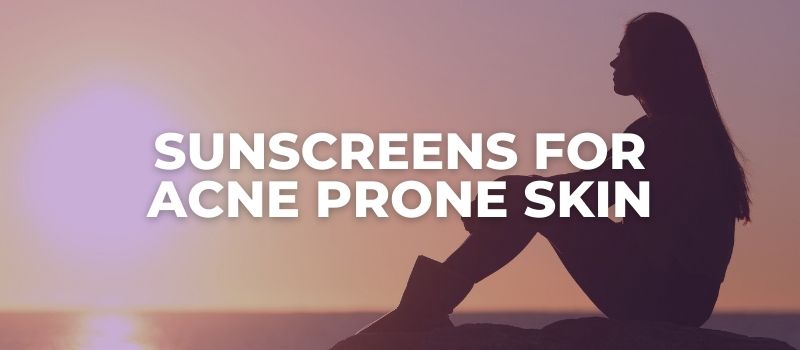
CLEAR Ultra-Light Hydrating Moisturizer SPF 30
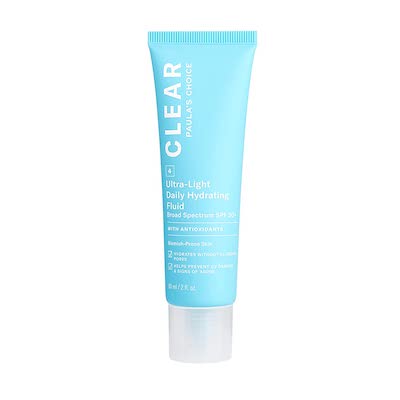
This is the best sunscreen for anyone who suffers from severe acne as it feels quite weightless on the skin and it also dries into a soft matte.
It provides broad-spectrum sun protection and it also contains great antioxidants as well as cell-communicating ingredients that help the skin recover from damage.
The only issue I have with it is that I wish it comes in SPF 50 instead of only 30 but hopefully that will change in the future.
RESIST Daily Hydrating Fluid SPF 50
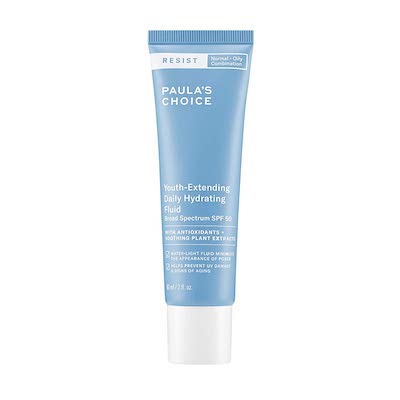
So, this is the SPF I go to when summer is coming and I need higher protection than SPF 30. The texture is very similar to the Ultra-Light Hydrating Moisturizer mentioned above, but it pleases me that this one has higher sun protection.
It also dries into a soft matte and is excellent for oily, acne-prone, and dehydrated skin types. In fact, I would highly suggest opting for this one in summer because you really need that higher protection, especially if you have acne.
RESIST Super-Light Daily Wrinkle Defense SPF 30
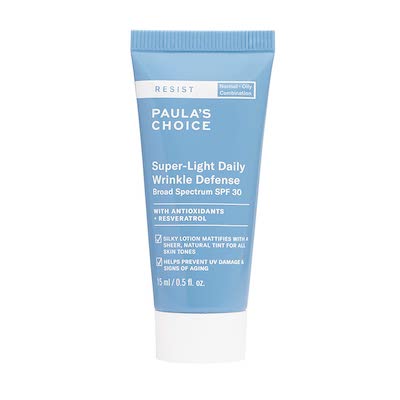
I love using this sunscreen on those days where I just don’t want to apply foundation and I am trying to get away with only a little bit of concealer under my eyes.
It is a physical sunscreen that contains zinc but it doesn’t leave a white cast because it has a tint. It also dries into a soft matte and while it does oxidize a bit on my excessively oily skin, the tint doesn’t change significantly as most of my foundations do.
It also keeps my skin mattified throughout the day and while I usually have to blot several times a day when wearing regular foundations, I don’t feel the need to when I have this sunscreen on. There would be a little bit of oiliness, but nothing that concerns me, really.
Additionally, it is also great for covering those pesky little spots and marks left from prior breakouts, something I have on my cheeks, mainly. I’ve posted about how this looks on my face on Instagram, so go there and check out my photos.
I also have a full review of this product, so if you want to check it out for more details, just click here.
SKIN-BALANCING Ultra-Sheer Daily Defense SPF 30
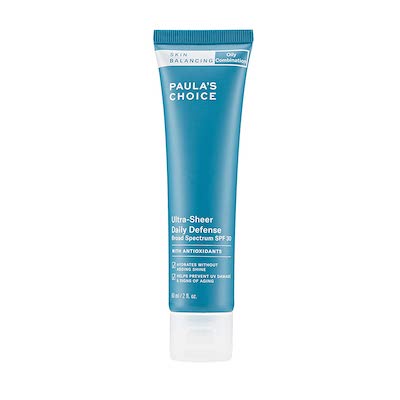
This one was a little too matte for me as I tend to gravitate towards products that don’t make my skin excessively oily but will still give me that nice a subtle glow.
This one is just matte so even though it wasn’t my favorite choice, I know a lot of people like their skin fully mattified so this might be a good option if you like that.
On the other hand, I enjoyed this product as a primer for my foundation because I use a lightweight and hydrating serum foundation so I still had that nice glow I love but the sunscreen prevented my skin from looking greasy throughout the day.
HYDRALIGHT Shine-Free Mineral Moisturizer SPF 30
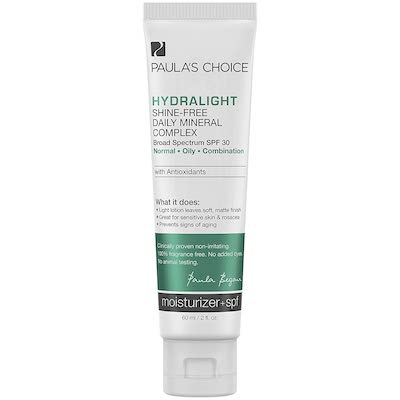
This is one of her older sunscreens and I have used it some time ago and I remember liking it simply because it wasn’t making my acne worse.
It’s not that special of a moisturizer, tbh. It hydrated the skin, dries out into a subtle matte and it offers broad-spectrum sun protection. It also contains some antioxidants to prevent skin damage and help it heal.
Nothing special, but still good. It’s suitable for acne-prone skin and it is not likely that it will aggravate your concern.
What Are The Main Causes Of Acne?

The exact cause of acne is simple: it all starts with a clogged pore.
No matter how small and insignificant or how severely inflamed your acne is, it all starts with a simple clog.
Acne develops when the pores on your skin become clogged with excess sebum and a mixture of accumulated dead skin cells, white blood cells, and bacteria buildup.
Your skin has small passages known as pores. Every single pore is an opening to a follicle and the follicle is made up of a single hair and a sebaceous gland.
The sebaceous gland releases an oily substance known as sebum which travels up and out of the pore and it then remains onto your skin to keep it moisturized and lubricated.
Now, this oily film is what keeps that skin soft and protected from external aggressors. It has mild bactericidal properties and it is on the acidic side of the pH scale, which is the oilier side in simple terms.
The mixture of dead skin cells and overgrowth of the bad strain of the acne-causing bacteria block the pores and prevent sebum from escaping, meaning it will remain trapped inside the follicle, causing a clog.
A study done in 2016 explains that all of our skin is covered in bacteria all of the time and this is the first line of defense against invading germs that can potentially be harmful.
So, this usually harmless bacterium that lives on our skin starts triggering inflammation and breakouts when it finds itself trapped in airless, oily conditions, such as hair follicles.
Meaning, when the bacteria aggravate the immune system, they cause the swollen, red bumps associated with acne.
So let’s explain in simple terms what is acne?
Acne an inflammatory occurrence that tells us our immune system is trying to protect us against something that doesn’t belong in our bodies.
Can The Sun Make Acne Worse?
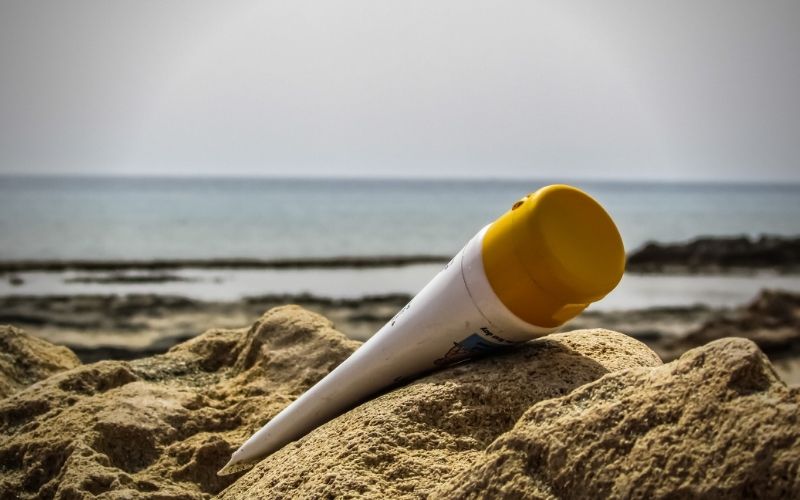
No, the sun will not directly make your acne worse, however, that doesn’t mean that it will not do some damage.
I’ve heard many people say that direct sun exposure can actually help with acne, and while direct sun exposure can be very therapeutic, you should always be wearing adequate sun protection when exposed to the sun.
Excessive sun exposure plus inappropriate sun protection will very easily cause pigmentation scarring in the areas you have acne and these can be much more difficult to treat and fade.
Additionally, the sun can dry out the outermost layer of the skin and even oily skin types can be stricken by this, however, the oil glands will then be triggered into producing more oil in an attempt to compensate for the lack of hydration on the skin.
This excess oil production, as we said above, can be the main culprit for more acne.
So, the sun definitely has the potential to make acne worse, but that doesn’t mean that you should be scared of going out in the sun. The only thing you should pay attention to is wearing adequate sun protection and you are good to go.
Is Sunscreen Bad For Acne?
Yes, sunscreen can be bad for acne, especially if you are not using the adequate formula for your skin type or the sunscreen you are using contains some problematic and clogging ingredients that will clog your pores and eventually cause more acne on the skin.
Additionally, if the sunscreen you are using contains drying alcohols such as Alcohol denat, this may dry out your skin and essentially trigger the sebaceous glands into overproducing oil, again, to compensate for the lack of hydration.
Furthermore, if the sunscreen you are using contains an excessive amount of fragrant components such as citrus oils, for example, this may not be the best option for your skin, as citrus oils have a bad reputation of becoming toxic when exposed to the sun.
So, sunscreen can be bad for acne, but it all comes down to the formula you are using and the ingredients this product contains.
When picking a sunscreen, it is always a good idea to do a little bit of research on the ingredients and pages like Paula’s Choice Ingredient Dictionary, Inci Decoder, etc, can definitely give you a good start on this.
Does Sunscreen Help Acne Scars?
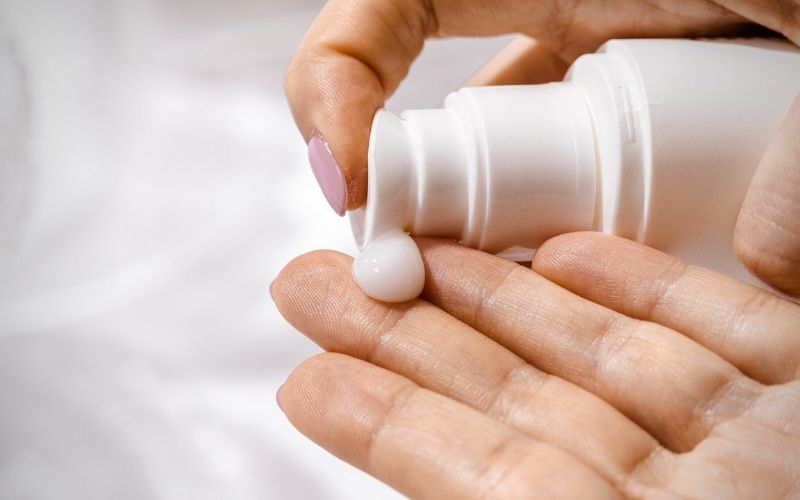
That depends on the type of scarring. If the scarring is something like post-inflammatory hyperpigmentation or post-inflammatory erythema, then yes, sunscreen can prevent it from becoming more severe, which tells us that your skin cannot heal if you are not protecting it adequately.
On the other hand, if the scarring is pitted into the skin, then sunscreen will not help correct it, but it will certainly prevent those tiny holes from becoming darker due to the UV rays.

My name is Simone and I am a certified skin specialist. I created this website to teach my readers how to take great care of their skin and I also like to occasionally share my honest opinions on skincare products I’ve tried. You can learn more about me here.
